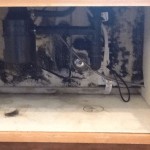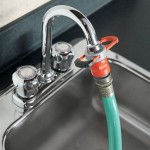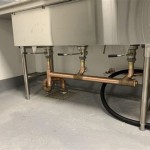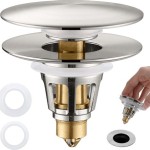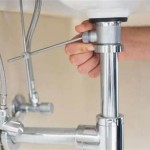Bathroom Sink Water Smells Like Rotten Eggs: Causes and Solutions
A persistent rotten egg smell emanating from a bathroom sink drain is a common household nuisance, often indicating the presence of hydrogen sulfide (H₂S) gas. This gas, even in low concentrations, possesses a noticeable and unpleasant odor, reminiscent of decaying organic matter or, more specifically, rotten eggs. The source of this odor can range from simple bacterial activity within the drain to more complex issues within the plumbing system or even the water supply itself. Identifying the root cause is essential for implementing the appropriate corrective action and ensuring the long-term resolution of the issue. This article will explore the various causes of this foul odor and outline potential solutions that homeowners can employ to address the problem.
The occurrence of a rotten egg smell should not be ignored, as prolonged exposure to higher concentrations of hydrogen sulfide can pose health risks. While the levels typically encountered in residential plumbing are generally low and unlikely to cause serious harm, it is crucial to address the issue promptly to prevent potential discomfort and ensure a healthy home environment. The detection of this smell also serves as an indicator of underlying problems within the plumbing system that, if left unaddressed, could lead to more significant and costly repairs in the future.
Understanding Hydrogen Sulfide (H₂S) Production
Hydrogen sulfide is the primary culprit behind the rotten egg smell. It is a colorless, flammable gas produced through various biological and chemical processes. In the context of a bathroom sink, the most common source is the anaerobic breakdown of organic matter by sulfate-reducing bacteria (SRB). These bacteria thrive in oxygen-deprived environments, such as the stagnant water that often accumulates in drainpipes. They consume sulfates, which are naturally present in water, and as a byproduct, release H₂S gas. The organic matter fueling this process can include hair, soap scum, food particles, and other debris that find their way down the drain.
The availability of sulfates plays a crucial role in the production of H₂S. Water sources with higher sulfate concentrations are more prone to developing this odor problem. This is particularly relevant for individuals who rely on well water, as well water often contains higher levels of naturally occurring sulfates. Municipal water supplies are generally treated to reduce sulfate levels, but variations in water source and treatment processes can still lead to occasional increases in sulfate concentration in the tap water.
Furthermore, the design and condition of the plumbing system can influence the growth of SRB. P-traps, which are designed to hold water and prevent sewer gases from entering the home, can inadvertently create stagnant environments conducive to bacterial growth. Irregular use of a sink, particularly in guest bathrooms, can exacerbate the problem as the water in the P-trap is not regularly flushed out, allowing bacteria to proliferate unchecked. Old or corroded pipes can also provide a more hospitable environment for bacteria to colonize, further contributing to the production of H₂S.
Common Causes of the Rotten Egg Smell
Several factors can contribute to the rotten egg smell emanating from a bathroom sink drain. Pinpointing the specific cause is essential for implementing the most effective solution. Here are some of the most common culprits:
- Bacterial Growth in the Drain: As previously mentioned, SRB are the most frequent cause. The accumulation of organic matter in the drainpipe provides the necessary food source for these bacteria to thrive and produce H₂S.
- Well Water Contamination: If the home relies on well water, the water itself may be the source of the problem. High sulfate concentrations in well water can directly contribute to H₂S production, even without significant bacterial activity in the drain. In some cases, the well water may also be contaminated with iron bacteria, which can contribute to the foul odor.
- Water Heater Issues: Although the problem manifests at the sink, the water heater can be a contributing factor. If the water heater's anode rod is made of magnesium, it can react with sulfates in the water and accelerate the production of H₂S. This is more likely to occur in older water heaters or those that have not been properly maintained.
- Dry P-Trap: While the P-trap is designed to prevent sewer gases from entering the home, it can become a source of the problem if it dries out. This often occurs in infrequently used sinks, allowing sewer gases, which may contain H₂S, to seep into the bathroom.
- Plumbing System Issues: Occasionally, more complex plumbing problems can contribute to the odor. A blockage in the main sewer line can cause sewage to back up into the plumbing system, leading to the release of H₂S gas. Similarly, a faulty vent pipe can prevent proper ventilation of sewer gases, forcing them back into the home through the drains.
Troubleshooting and Solutions
Addressing the rotten egg smell requires a systematic approach to identify and eliminate the source of the problem. Here are some steps that can be taken to troubleshoot and resolve the issue:
1. Flush the Drain: The simplest and often most effective first step is to thoroughly flush the drain with hot water. This helps to dislodge any accumulated debris and disrupt the bacterial colonies. Running hot water for several minutes can often temporarily alleviate the odor problem. For added cleaning power, consider adding a cup of baking soda followed by a cup of vinegar to the drain. Allow the mixture to fizz for 30 minutes, then flush with hot water. This creates a natural cleaning reaction that helps to break down organic matter and kill bacteria.
2. Clean the P-Trap: If flushing the drain does not resolve the problem, the P-trap should be cleaned. Place a bucket under the P-trap to catch any water, then carefully loosen the slip nuts that connect the P-trap to the drain pipes. Remove the P-trap and thoroughly clean it out, removing any accumulated debris. Rinse it with water and reassemble it, ensuring that the slip nuts are tightened securely. Make sure to run water for a few minutes to refill the trap. Consider using a pipe brush to scrub the inside of the drain pipes connected to the P-trap for a more thorough cleaning.
3. Check for Dry P-Traps: If the sink is infrequently used, the P-trap may have dried out. Simply running water down the drain for a few minutes will refill the trap and prevent sewer gases from entering the home. To prevent the P-trap from drying out, pour a small amount of mineral oil or vegetable oil into the drain. The oil will create a barrier that prevents the water from evaporating.
4. Test the Water Supply: If the problem persists after cleaning the drain and P-trap, the water supply itself may be the source of the odor. A water test can determine the sulfate concentration and identify any other contaminants that may be contributing to the problem. Home water testing kits are available, or a sample can be sent to a certified laboratory for analysis. If the water test reveals high sulfate levels, a water treatment system, such as a sulfate reduction filter or a reverse osmosis system, may be necessary.
5. Investigate the Water Heater: If the home utilizes a water heater, it could be contributing to the rotten egg smell. Inspect the water heater's anode rod. If it is made of magnesium, consider replacing it with an aluminum or zinc anode rod, which are less likely to react with sulfates. Flushing the water heater regularly can also help to remove sediment buildup and prevent the proliferation of SRB. Follow the manufacturer’s instructions for flushing the water heater.
6. Inspect the Plumbing Vent System: The plumbing vent system allows sewer gases to escape outside the home. A blocked or damaged vent pipe can prevent proper ventilation, forcing gases back into the home through the drains. Visually inspect the vent pipe on the roof for any obstructions, such as bird nests or debris. If access to the vent pipe is difficult or unsafe, it may be necessary to consult with a plumbing professional.
7. Seek Professional Assistance: If the above steps do not resolve the rotten egg smell, it is advisable to consult with a qualified plumber. A plumber can conduct a thorough inspection of the plumbing system to identify any underlying issues, such as blockages in the sewer line or faulty vent pipes. They can also provide professional cleaning and repair services to address the problem effectively.
Regular maintenance of the bathroom sink drain is crucial for preventing the recurrence of the rotten egg smell. This includes regularly flushing the drain with hot water, cleaning the P-trap periodically, and avoiding the accumulation of hair and soap scum in the drainpipe. By taking proactive steps to maintain the plumbing system, homeowners can minimize the risk of developing this unpleasant odor and ensure a healthy home environment.

Does Your Water Smell Like Rotten Eggs Treatment Test

Why Your Water Smells Like Rotten Eggs Sierra Air Conditioning Plumbing

What To Do If Your Water Smells Like Rotten Eggs Cooper S

What To Do When Your Drains Smell Like Rotten Eggs Black Haak

Do Your Drains Smell Like Rotten Eggs Huft Home Services

Your Household Water Quality Odors In Uga Cooperative Extension

Pin On Brandon Ranch Ideas

Does Your Water Smell Like Rotten Eggs Treatment Test

Your Toilet Smells Like Rotten Eggs Mr Rooter

How To Treat Sulfur Odors In Well Water Smells Like Rotten Eggs
